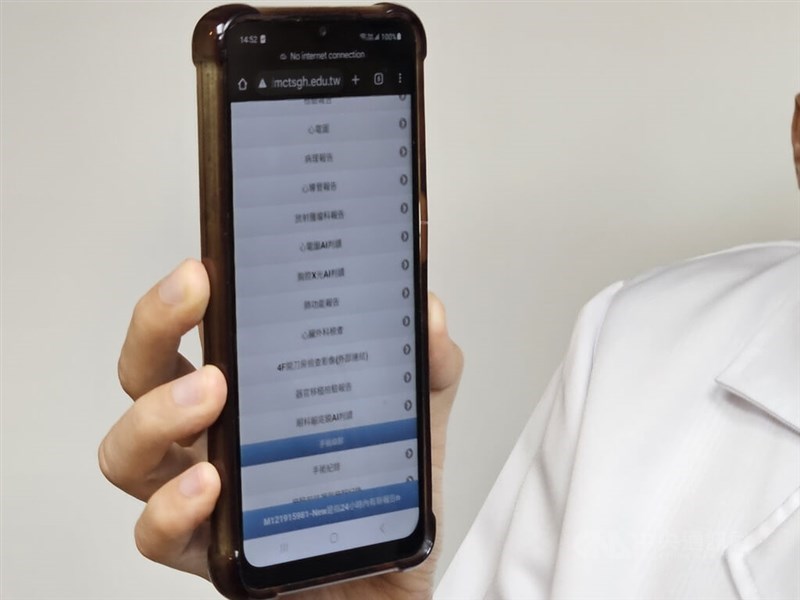Taiwan hospital debuts AI dialysis platform to boost efficiency, safety

Taipei, Oct. 16 (CNA)Tri-Service General Hospital (TSGH) unveiled Taiwan's first AI-powered dialysis platform on Wednesday, saying it will enhance the efficiency and mobility of the blood filtering process for patients with severe kidney disease.
The new platform integrates information systems, AI decision support, and mobile apps to not only allow a smoother delivery process but also faster detection of dialysis complications, the hospital said.
"Taiwan currently has the highest prevalence of dialysis in the world," with a total of 89,700 patients as of 2023, Hsu Shun-neng (許舜能), chief of TSGH's Dialysis Center, said Wednesday, citing a report by the Taiwan Society of Nephrology.
Dialysis is a blood-filtering treatment that removes waste and excess fluid when the kidneys can no longer do so, with patients typically undergoing the procedure three times a week at hospitals, Hsu said at a press conference at TSGH in Taipei.
The frequent long-term nature of dialysis, which usually ends only if the patient has a kidney transplant or rare recovery, requires heavy paperwork and limits patients' ability to travel abroad, he said.
"A decade ago, we speculated on whether those thick stacks of patients' dialysis records could be discarded and fully digitized," to significantly improve efficiency, Hsu said.
With that thought in mind, Hsu said, he and his team last year developed the Portable Hemodialysis Automation and Decision Support Platform, which enables clinicians on ward rounds to issue medical orders via an app integrated with the hospital's information systems.
The platform, officially launched Wednesday, is already in use for 150 dialysis patients at TSGH, streamlining workflows and reducing paperwork, he said.
It also makes the dialysis process safer, as it allows for AI alerts based on data tracking via an app, Hsu added.
Another dedicated app allows patients to review their dialysis records over a one-year period, access personalized information about dialysis care and kidney disease, and receive remote guidance in support of self-management at any time, Hsu said.
That app can also generate a bilingual dialysis report for patients traveling abroad, and it allows foreign physicians to view the patients' dialysis records in Chinese and English, Hsu said.
Other clinical uses of the new AI-powered platform include analysis of patients' test results and vital signs, flagging of potential abnormalities that may signal dialysis-related complications, and reminders to physicians for follow-up checks, Hsu said.
He cited the case of a 67-year-old long-term dialysis patient whose routine chest X-ray appeared normal but was flagged by the platform as being at high risk for fractures. A series of follow-up tests revealed that the patient did indeed have previously undetected micro-fractures and low bone density, Hsu said.
The micro-fractures were linked to severe osteoporosis in the patient, who had been on dialysis for 20 years, he said, adding that poor calcium absorption and fragile bones are side effects of chronic kidney disease.
Regarding its future development, the platform has cleared the Fast Healthcare Interoperability Resources (FHIR) validation, allowing for standardized data exchange with hospitals in other countries, according to Hsu.
The software-led platform can integrate with existing hardware in other hospitals, including those in the United States, he said.
"I think it has a real chance of being promoted worldwide," Hsu said.
However, "at this stage, I think the system is more likely to be rolled out in developed countries," he said.
-
Society
Taipei restaurant ordered to close after diners fall ill
02/18/2026 11:25 PM -
Politics
Lai congratulates Takaichi on reelection as Japan PM
02/18/2026 10:09 PM -
Politics
NGO calls for overseas missions to use 'Taiwan' instead of 'Taipei'
02/18/2026 07:49 PM -
Society
Temperatures to rise Thursday as cold air weakens
02/18/2026 07:29 PM -
Politics
Calls for Six Assurances law after Trump Taiwan arms comments
02/18/2026 07:16 PM